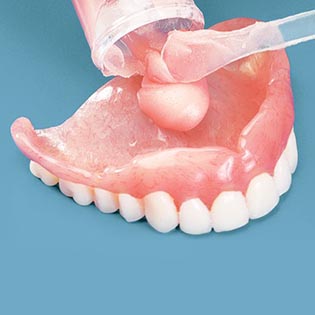What is Denture Reline?
Just like your natural teeth, dentures need to be constantly cared for — this means excellent habits at home and regular dental visits. In addition, dentures need to be periodically adjusted for a proper fit to avoid causing discomfort or difficulty chewing. Every few years, your dentist will usually recommend that your dentures be relined, or resurfaced, to conform to the changing contours of your mouth.
Why Is Denture Relining Necessary?
The bones and tissues in your mouth change over time. In fact, once you have a tooth extraction, the bone that once held the tooth in place begins to shrink. Since dentures require a tight fit against your gum tissue, it’s important to adjust the denture base to keep up with this shift.
Poorly fitting dentures can also contribute to the problem by wearing down the bone and soft tissues in your mouth more quickly. Relining your dentures helps minimize this erosion, as well as compensate for natural oral changes. Finally, dentures aren’t indestructible — they need to be consistently maintained and repaired to keep them as effective (and attractive) as the day you got them.
How Your Dentist Keeps You Well Adjusted
Your dentist begins by removing a layer of the existing denture surface. A putty-like material is filled in and inserted into your mouth to make an exact impression of the denture area. Once this impression has hardened, it is used to create a new surface or base for the existing denture teeth. This step is sometimes completed in the dental office, but more often is done in a lab to produce a longer-lasting surface.
There are two types of denture relines:
Hard Denture Reline — The impression material is replaced with a hard pink acrylic that is perfectly formed to the contours of your mouth. This type of relining is recommended every two years and provides the most contact with your gum tissue for maximum hold.
Soft Denture Reline — For patients whose gums are too tender for hard relining, dentists may opt to reline the denture surface with a softer, more flexible material. Although easier on the gums, this type of relining may have to be replaced more often to maintain a proper fit.
Denture Loving Care
It’s a fact — over time dentures become worn and don’t fit as well, so it’s important to reline them regularly. Denture adhesives, while a great way to help keep well-fitting dentures in place, should not be used in place of continual denture relining. See your dentist on a regular basis and make sure to communicate any changes in the way your dentures fit or feel. With proper denture care, your dentures can keep you smiling for years to come otherwise be prepared for costly emergency denture repairs when you experience issues with your dentures..

